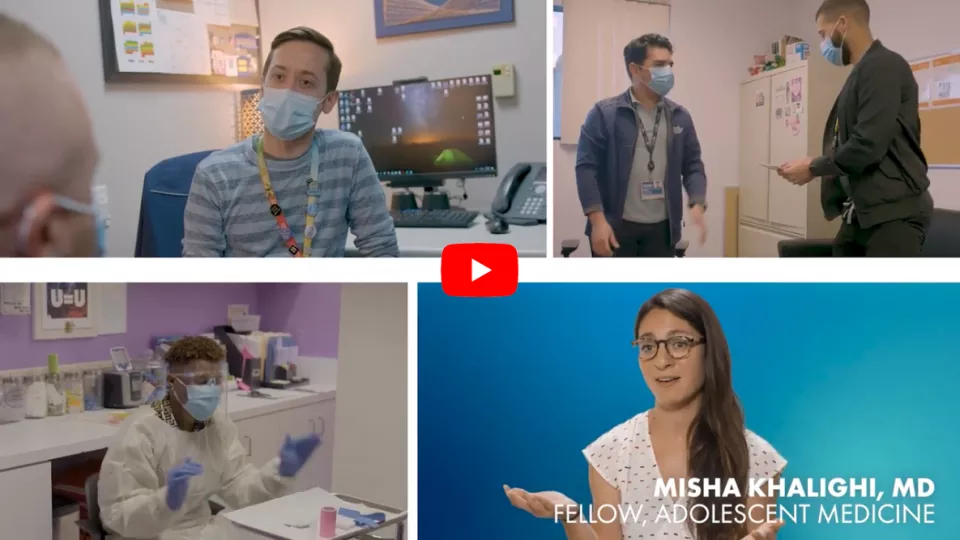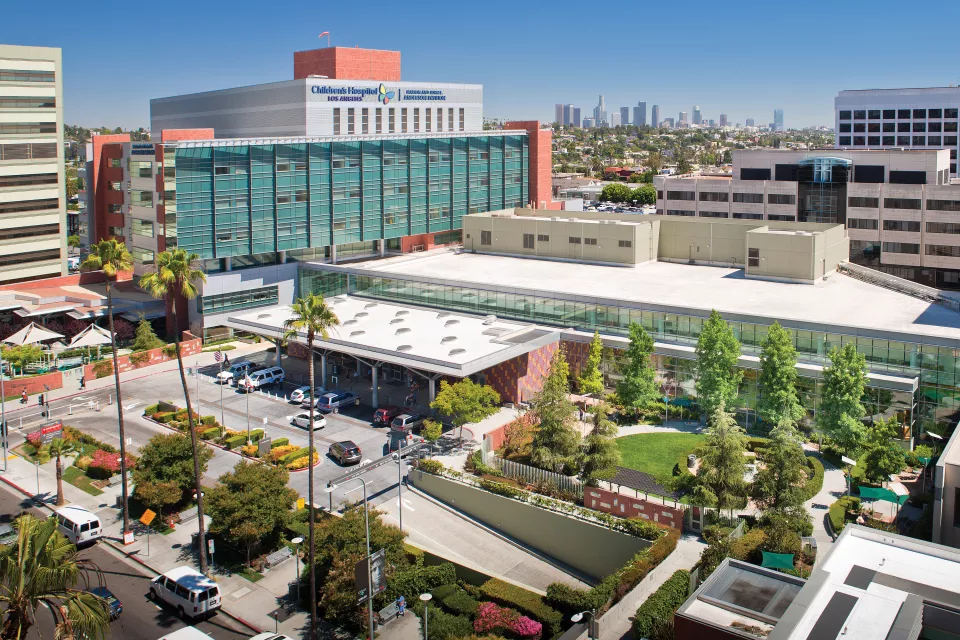
About the Fellowship
The Division of Adolescent and Young Adult Medicine at Children’s Hospital Los Angeles was established in 1963, making it one of the most established adolescent medicine divisions in the United States, and the first on the West Coast. The Division has been training adolescent medicine fellows and producing experts in the field since 1967. In fact, the national Society for Adolescent Health and Medicine was formed in our division, and was based in our office for many years prior to centralizing its headquarters in the Midwest. Most recently, the Division was awarded a Leadership Education in Adolescent Health (LEAH) grant from the Maternal and Child Health Bureau, making it one of only seven LEAH programs nationwide.
Learn More About the Training Program
The Adolescent Medicine Fellowship at Children's Hospital Los Angeles is a three-year program intended to prepare fellows for a career in clinical and academic adolescent medicine (please see ‘program tracks’ below for additional details). It features an interdisciplinary, bio-psychosocial model of care, and offers fellows a unique, rich clinical experience via numerous programs and training sites. It also offers extensive opportunity to conduct original research, and to participate in ongoing research, with formal mentoring through the Division of Adolescent and Young Adult Medicine’s faculty, as well as utilization of resources at The Saban Research Institute of CHLA and the Keck School of Medicine of USC. Additionally, the program aims to prepare fellows for Board certification in adolescent medicine. The Division’s programs and faculty have been recognized both locally and nationally, through numerous ongoing research and service grants, as well as through many awards.
Clinical Experience
Our clinical experiences are tailored to expose fellows to adolescents in a variety of settings:
- Teenage and Young Adult Health Center - hospital-based outpatient clinic that provides both primary and consultative care to both healthy and chronically-ill youth from the community, as well as to youth in foster care.
- Job Corps - federal vocational trade program with comprehensive on-site health services.
- Homeless Adolescent and Young Adult Wellness Center - medical and behavioral health services for youth experiencing homelessness.
- Covenant House - residential shelter for high-risk youth with in-house medical clinic.
- College Health - longitudinal rotation at USC Engemann Student Health Center.
- Inpatient Consult Service - located at Children’s Hospital Los Angeles, diverse patient population at large, urban, tertiary care free-standing children’s hospital.
- My Voice Adolescent Transition Program - transition medicine services for young adults with chronic medical problems and special healthcare needs preparing to enter into adult care.
- Planned Parenthood LA - comprehensive sexual and reproductive health clinic, both school-based and health-center based.
Guiding Principles
- We are committed to comprehensive health care and programming that is client-directed, sex-positive, and celebrates that young people have the agency to make health decisions for themselves and their children.
- We believe in the importance of working toward sustainable improvements and growth that support equity and anti-oppression; address health disparities caused by systems informed by white supremacy; and support the overall health and well-being of young people, specifically Black, Indigenous and Youth of Color (BIYOC).
- We acknowledge and commit to increasing awareness that oppression and white supremacy are historically and currently intentionally embedded into our medical and care systems and professions. We are dedicated to combating and deconstructing these long-standing aspects of our collective existence.
- We believe in the inherent resilience, autonomy, and capacity of young people to define and achieve their goals and navigate life challenges ranging from individual stressors, such as adverse childhood experiences (ACEs), to societal stressors/challenges that commonly include systemic oppression.
- We are committed to creating and maintaining trauma-informed safer spaces for young people, staff, trainees, and faculty, where they can express who they are without fear of bias and discrimination. Trauma-informed care specifically includes engagement with young people with the intention of nurturing healing, recognizing that anti-blackness in our space is a barrier to necessary healing, and working toward creating and maintaining safe spaces for all Black young people, staff, trainees, and faculty.
- We affirm queer and trans identities and the intersectionality of youth identities. We foster a queer-affirming network and act with the intention of freeing ourselves from hetero- and cis-normative thinking.
- We value reflective learning and cultural humility as core strategies for personal and professional growth and un-learning the way we have been complicit and explicit in maintaining white supremacy and intersecting oppressions, including but not limited to cisheteronormativity, adultism, and elitism.
- We acknowledge that systemic racial oppression, white supremacy, and white privilege play a prominent role in society. We acknowledge that if we are not Black, we are socialized to navigate the world with anti-blackness and white supremacist attitudes.
- We commit to engage in both restorative justice and social justice approaches to address missteps, learn from mistakes, be accountable, and focus on truth and transparency.
- We value the contributions of lived experience and the voices of historically and currently marginalized communities and use these experiences to inform, direct, and create collaborative and culturally congruent research, programming, training, and services.
- We commit to recruiting, hiring, and retaining Black, Indigenous and People of Color (BIPOC) as staff and faculty, specifically Black-identified staff and faculty. We view diversity in cultural identities as an area of professional expertise. We commit to professional development of our BIPOC colleagues, upward mobility, and representation in leadership positions.
- We practice cultural humility and seek to develop respectful partnerships with youth and their communities and to explore similarities and differences between the community and funders’ priorities, goals, and capacities. We are committed to taking action to align with the values of the communities we serve.
- We are dedicated to creating and sustaining intentional relationships with youth, families, community members and leaders, other professionals, providers, and national advocates to better address health inequities.
- We strive to cultivate an intergenerational and communal network free from ageism and adultism. We believe that all people, regardless of age, show up with the capacity to lead and learn.
Elective Rotations
There are various elective rotations that are available both at our hospital and at outside institutions, including:
- Sports medicine
- Comprehensive Pain Management Clinic
- Eating Disorders
- Endocrinology/Healthy Weight Clinic
Enriched Clinical Experience Is Available In:
- HIV care
- Interdisciplinary Adolescent Hematology care
- Gender Care
Research, Policy and Advocacy
The CHLA LEAH program provides medical fellows a 9-month long interdisciplinary training curriculum that brings them together with psychology, nursing, nutrition, and social work professionals and professionals-in-training, to learn together and to move the field of adolescent health forward, through public health and advocacy-centered projects, using innovative teaching methodologies and community partnerships.
Additionally, a cross-divisional, didactic, lecture-based core curriculum focused on teaching and research methods is delivered to all Children’s Hospital Los Angeles fellows in both the first and third years. Fellows conduct research and are mentored by medical and behavioral health faculty, and are involved in advocacy and policy development activities through the Division’s community-based programs.
In coordination with the program director, fellows choose their research project and identify mentors and a Scholarship Oversight Committee, during the first fellowship year. During the second and third years, fellows will conduct their studies, analyze their data, and prepare a manuscript. They are encouraged to attend and present their research at institutional, local, and national scientific meetings, through poster presentations and lectures, and are strongly encouraged to submit their prepared manuscript for publication in a peer-reviewed, scholarly journal.
Recent fellow research projects titles/topics have included:
- Retrospective multicenter study: bleeding disorders and the efficacy of the 52-LNG-IUS for heavy menstrual bleeding in adolescents
- Predictive Factors of Attrition in Pediatric Weight Management
- Hormonal treatment of acute heavy menstrual bleeding in hospitalized adolescents with severe anemia
- Characterizing and Understanding the Experience of Trafficked Youth in Los Angeles
- Chest Dysphoria in Transmasculine Minors and Young Adults
- Adolescent Experiences with the Contraceptive Implant
- Transgender Youth and Family Support
- Transitioning Patients to Adult Care: Experience of both Pediatric and Adult Primary Care Providers
- Sexting and Adolescents
- Advance Supply of Emergency Contraception
Diversity, Equity, and Inclusion within DAYAM
- Who We Are: CHLA Careers
- The CHLA Division of Adolescent and Young Adult Medicine (DAYAM) is committed to fostering an environment of diversity, equity, inclusion, and to working to eliminate health disparities in both our community and our workforce. We believe that community health equity is intimately intertwined with equity in our workplace. Thus, we are committed to building a vibrant and culturally diverse community of faculty that best reflects the patients and families we serve. The DAYAM welcomes and encourages all qualified applicants, especially those from backgrounds that are underrepresented in medicine, to apply to our fellowship program.
- Our Adolescent Medicine Fellowship program provides education to fellows on health equity across race, ethnicity, age, sexual orientation, gender identity, and ability, through a number of means:
- Our LEAH Curriculum, with didactic and project-based modules on structural racism and its impact on the 5 LEAH disciplines (Adolescent Medicine, Nursing, Nutrition, Psychology, and Social Work)
- Our DAYAM weekly interdisciplinary grand rounds lecture series
- Clinical opportunities in community sites serving youth with unequal access to health and healthcare including our own Teenage and Young Adult Health Center, Covenant House, Job Corps, and Planned Parenthood
- Opportunities for advocacy through the CHLA Advocacy collaborative, LEAH, and other divisional efforts
Program Tracks
In addition to the traditional three-year fellowship track, which maximizes fellows’ potential research impact, a two-year track is also available (though for pediatric graduates wishing to become board-certified, three years of fellowship are required).
How to Apply
The CHLA Adolescent Medicine Fellowship Program participates in the National Resident Matching Program (NRMP), and takes applications via the Electronic Residency Application Service (ERAS). All interested applicants must submit their application through ERAS.
Program Fast Facts
AGME Accredited: Yes
Fellows per year: 1-2
Applicants are welcome from the following primary specialties:
- Combined Internal Medicine-Pediatrics
- Family Medicine
- Internal Medicine
- Pediatrics
Application Timeline: Applications will be accepted via ERAS from July through September
Duration: 2-3 years, depending on residency
Postgraduate Training Required: 3 years
U.S. Citizenship Required: No
Salary Minimums:
Post Graduate Year 4: $84,073.60 minimum
Post Graduate Year 5: $87,401.60 minimum
Post Graduate Year 6: $90,667.20 minimum
Benefits Include: Health and dental insurance, 14 days paid vacation+ 6 protected sick days, yearly educational stipend, monthly meal stipend, and 401(k) matching up to 3%
Where Do Fellows Go When they Graduate?
Fellows who have graduated from our program in the last 10 years have obtained positions at the following institutions:
- Cincinnati Children’s Hospital Medical Center
- Children's Hospital Los Angeles
- Children’s Hospital Orange County
- Torrance Memorial Medical Group
- Otis School of Design Student Health and Wellness Center
- University of Illinois College of Medicine at Chicago
- Rady Children’s Hospital-San Diego/UC San Diego
- Lurie Children’s Hospital, Northwestern University Feinberg School of Medicine
- Kaiser Permanente Southern California Medical Group
- Lucille Packard Children’s Hospital, Stanford University
